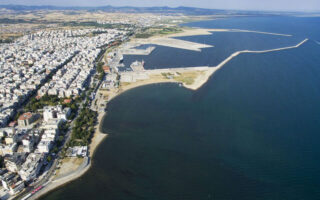Tariff shields a burden on future generations
In Kathimerini interview, Nobel-winning economist voices concern over rise in Europe’s public and private debt

“Really? No one will pay?” asks Dr Jean Tirole, honorary chairman of the Foundation JJ Laffont-Toulouse School of Economics (TSE) and scientific director of TSE-Partnership, about the state subsidies introduced by European governments on electricity and gas bills to protect households from the energy crisis. Speaking to Kathimerini, the 2014 Nobel Prize winner in economic sciences, warns that the tariff shields place a burden on future generations to finance current consumption and debt while at the same time trapping governments politically.
Concerning political developments in Italy, Tirole appears worried about the debt in the eurozone and expresses his anxiety about the scenario of stagflation, through a spiral of increases in prices and wages. He also emphasizes that, in contrast to the US, the need to increase interest rates is not so strong in Europe.
The Nobel-winning economist also believes that the green economy is necessary, but it will have costs and will not facilitate development. He also said that “the state ideally sets the rules and intervenes to correct market failures, rather than substituting itself for the market as a mediocre manager of enterprises.” As for the future of globalization, he provides a blunt answer: “I don’t know.” But, “make no mistake, if it may be unavoidable, slowbalization will come with a decline in our living standards.”
The following is part of Kathimerini’s conversation with Dr Tirole. Read the entire interview at kathimerini.gr. The French economist will deliver a lecture titled “Economics at the Service of the Common Good” at the Theo Angelopoulos Auditorium of the French Institute in Athens on Wednesday, September 28. The lecture is organized on the occasion of the publication in Greek of his book “Economics for the Common Good,” by Crete University Press.
There is concern that the state’s spending on supporting citizens and businesses in the face of the pandemic, the energy crisis and inflation will give rise to another crisis, a debt crisis. At the end of the day, who will pay the bill?
The rise of public and private debt in European countries is a concern. We successively faced the financial crisis, the eurozone crisis, the Covid recession and now the Ukraine crisis. Each time we lose a bit of room for maneuver. Inflation, the extra costs associated with the new cold war (energy, rearmament, less-diversified supply chains) will take their toll. Hopefully these shocks will be temporary, but we cannot fully guarantee that. Above all, we need to fight climate change – we have been procrastinating for 30 years and are now standing with our back to the wall.
States systematically emerge from crises with more debt, frustration grows and inequality increases. But there is good news too. We knew, for example, that one day there would be a major global pandemic (and there will be others), but technological progress has made it possible to produce vaccines in a few months where it would have taken a decade before. Many deaths and lockdowns have been avoided. This is because we had the US National Institutes of Health and the European Research Council had invested earlier in the fundamental science that allowed a rapid deployment of vaccines.
Thus, while the current situation could be the perfect storm, there is also hope, provided we invest in our future and do not borrow to finance current consumption. Populists are often keen on letting the budget deficit slide, with limited investment that would reassure investors that our countries are solvent. I was less worried about the Italian debt under Draghi. The return of demagogic politicians could create negative expectations; of course, the ECB would still be able to monetize Italian debt to rescue Italy, but that would fuel inflation and in the long run it is the euro as a whole that could lose the trust of investors.
We must invest massively in education, research and development, the prevention of chronic illnesses, the reduction of inequalities and obviously climate change. There obviously is a war in Europe, as well as a war against global warming. I don’t see our fellow citizens ready to make the necessary efforts. This is my real concern, even though the means to get out of the crisis exist.
Eurozone fiscal rules. What is your contribution to a debate that has not yet begun at the institutional level?
We know that despite some improvements after the financial crisis budgetary rules are rather rough. In part because there is no magic number (40% debt may be unsustainable for one country, another may easily bear 150%). How much is sustainable depends on a series of factors: the growth rate (a given debt is much easier to sustain if the rate of interest lies below the rate of growth), who owns the debt (investors are less concerned if a large percentage of the debt is held domestically, as the country is less likely to default on its own citizens and banks), the ability to increase fiscal pressure if needed, the maturity of the debt (short maturities are harder to meet), the currency denomination of the debt etc. And off-balance sheet exposures, such as guarantees on mutual eurozone debt or on state-owned enterprises, are sometimes hard to evaluate (in contrast, pensions, which are another off-balance sheet liability, are easier to predict). In part because we are not that good at telling what an investment is or is not. Spending on education can be a formidable investment in our future, but it also can be pure consumption, depending on whether the corresponding public service improves in proportion to the education budget.
The control of public finances is a complex exercise, and no single policy will solve it. Independent internal bodies such as courts of audit are useful, but their recommendations are often followed by too few effects. Scenarios for public finance stress tests prepared by independent budget committees and followed by a democratic debate can be useful, as is the creation of independent public observatories that try to measure long-term public performance. But in the end a well-functioning, mature democracy with informed citizens is the best remedy against financial skidding.
The inability of the market to hold prices steady in the face of the current conditions brings back the debate on the degree of state intervention. We even have examples of nationalization of companies in the sensitive energy sector. What is your opinion?
It is true that we are facing an unprecedented shock in energy prices. We have to protect the poor in view of the huge increase in energy prices. I am not sure our democracies are doing it the right way, though. The tariff shield that was put in place in many countries (in France no consumer increase in the price of gas and a very limited increase in the price of electricity) amounts to telling people, “Gas, electricity and oil prices have soared, we are collectively impoverished, but you will not suffer any increase on your bill.” Really? No one will pay? We are forgetting about future generations who will be burdened by the resulting debt. We are out of line, even if I understand the political decision.
We are also totally forgetting the ecological objective. The tariff shield, which costs the state a lot of money – €24 billion over one year in France – is an additional subsidy to fossil fuels, and does not target the needy since everyone benefits from it. The economist’s preferred solution would have been to give a check to the most needy households but to keep a form of “price signal” so as to encourage savings on fossil fuels; or more likely to play a bit of both instruments, as it is clear that compensation never perfectly reaches its target. We have probably gone too far with the tariff shield. It will be politically very difficult to get out of it.
Greedflation
Do you agree with the view that part of the price increases is due to what we call greedflation? That is, the greed of some companies – very often monopolies or oligopolies – which take advantage of the conjuncture to raise prices.
There may be instances of abuse of market power. But the underlying phenomenon is unrelated to the market power of companies. Take the electricity market. The marginal means of production is often a gas turbine. Put more simply, when I consume one more kilowatt-hour, that Kwh is going to be supplied by gas, the available renewable, nuclear, hydraulic power plants producing already at capacity. The price of gas had gone up a lot over the last year (by a factor of 10). Per se, the reaction of wholesale electricity prices just captures the scarcity of electricity. Of course inframarginal power plants (renewable, nuclear and hydraulic) make very large windfall profits (as they would make unwanted losses if there were a glut of electricity). Europe is taxing them, as they would be bailed out in the symmetric case in which they incurred large fortuitous losses.
The current price crisis is a subject on which many different opinions have been expressed. What is your analysis? Is the high inflation temporary?
Some of the inflation is hopefully temporary: the energy and food price shocks, the disruption of supply chains and the Chinese Covid crisis. We are also facing the inflationary pressure of the past stimulus policies. What we need to avoid is inflationary expectations and the price-wage spiral, so as to avoid the stagflation experience we had after the oil shock of 1973. The increase in interest rates of the early 1980s to break the inflationary spiral of the 70s was socially very costly, and we can only hope that we won’t have to see a repeat of such an episode. Indexing salaries to prices today would be very dangerous. Europe is suffering from an inevitable loss of purchasing power. The question is how to allocate the loss between workers, companies, and between present and future taxpayers. Indexation, inflation and recession would be a very expensive way to do it.
In the US, there is a very strong momentum and a very tight market, and a need to slow down the activity through a rise in interest rates. In Europe, the market is less tense, and our countries have lost purchasing power; the need to raise rates is not as strong. That being said, the current differential between inflation in Europe and the very low nominal interest rates is really striking.
One of the biggest “sick men” in Greece is considered the state. What would you say are the elements that determine the success of a public administration reform?
The concept of the state has changed. The modern state should correct market failures. It should regulate banks, guarantee fair competition, tax externalities such as CO2 emissions etc. It should provide for an economic and societal framework in which individuals’ and companies’ incentives are, as much as possible, aligned with the common good. It should build a set of insurance mechanisms that protect citizens against mishaps of life (from being born in a disadvantaged family and not having access to a good education, to having bad health or having an accident, to losing one’s job), while keeping incentives in place (for example not insuring homeowners who have knowingly built in a flood-risk area). In a nutshell, it should promote a harmonious society.
In contrast, the modern state is no longer a provider of jobs through the civil service and a producer of goods and services through public enterprises. Rather, the state ideally sets the rules and intervenes to correct market failures, rather than substituting itself for the market as a mediocre manager of enterprises.
In its operations, the state should be nimble and reactive. In “Economics for the Common Good” I describe some principles and experiments around the world. It is important to use benchmarking both domestically and with foreign countries to evaluate performance and identify problems. The state should allow experiments and innovation, trust the management of schools, hospitals, public financing, and other undertakings, while evaluating ex post their performance and acting upon the information. It should define goals rather than paths to reach this goals (remember the discovery of the Covid vaccine: We did not know which of the alternative technological approaches would work; fortunately the states remained humble and did not bet on a single approach that they believed would be the most likely one to succeed). Finally budget cuts across the board are not advisable: Cut budgets where they are the least useful. Similarly, spreading budgets across many recipients can be wasteful: One must sow where the soil is fertile.
A last remark: It is often thought that “this is not the right time to reform the state”; some countries such as Canada, Sweden and Germany have however shown that broad reforms of the state can be implemented in difficult times.
The effects of climate change add one more parameter – an imperative one – to the growth process. Are you concerned that environmental restrictions will moderate future economic growth rates in Europe?
Combating global warming will inevitably have a cost, even if there is uncertainty about its level. The idea of increased growth based on millions of green jobs is a pipe dream.
Such restrictions as well as cutting-edge green R&D are therefore unavoidable if we want to save our planet. Certainly they will in the short and medium term impact economic growth, but otherwise we are headed toward an economic, environmental, societal and geopolitical disaster. Minimizing the cost of fighting climate change however is also crucial, first by stopping our collective procrastination and second by using the right instruments.
And among the right instruments, a carbon price is important. It is very effective for three reasons. The first is that a carbon price provides an incentive for companies that can avoid emitting a ton of carbon for a cost of 10 euros to do so in priority to companies that would have to spend 1,000 euros to achieve the same result. This makes it possible to focus first on the least costly climate-friendly actions. This is essential because the money needed for the ecological transition is so scarce. This applies not only to companies, but also to individuals and the state. Without a carbon price, the transition will cost much more.
The second reason for the need for a carbon price is that the absence of a credible long-term carbon price discourages green investments and R&D in green energy. Unless we hand out huge subsidies to companies, the necessary investments are not profitable. The third advantage of the carbon tax is its simplicity: When we choose among tomatoes, their carbon emissions will be included in the price; otherwise, when trying to be respectful of the environment, we have to figure out the emissions due to truck transportation, to greenhouse growing etc, and put a price on carbon; we don’t have the necessary information.
Do you see signs of protectionism in international trade? Or do you agree with the view expressed to Kathimerini by Pascal Lamy about slowbalization?
I don’t know. During the Covid crisis I was of the view that international trade would remain strong once the virus was kept under control. The supply chains proved relatively resilient during the pandemic. And investment in the supply chains sunk [because of Covid], so their availability would mean that globalization would continue (with some qualitative adjustments so as to better protect its losers).
Now I am not so sure. The main argument for the advent of slowbalization is the geopolitical tensions between the West and the autocratic bloc (in particular Russia, China); the lack of trust will imply that countries will be less willing to purchase key inputs from countries or invest financial assets in countries that are not perceived as friendly. Globalization requires a peaceful environment. To protect themselves, countries may decide to produce at home, or to source only from friendly countries (Americans call this “friendshoring”). International trade is likely to decrease. And yet, even if there are winners and losers, international trade is a fundamental factor of growth, especially for poor countries. But on our side, make no mistake: If it may be unavoidable, slowbalization will come with a decline in our living standards.





